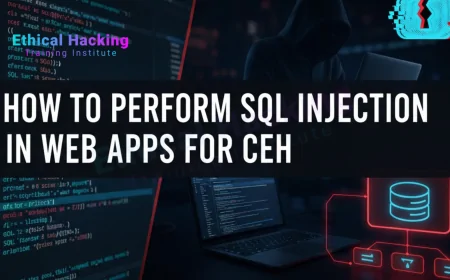Enroll in India’s Best CPENT Certified Penetration Testing Course | Advanced Ethical Hacking Training
Join India’s top CPENT Certified Penetration Testing course and master advanced ethical hacking skills. Learn exploit development, pivoting, cloud attacks, and enterprise-level security testing through hands-on labs and live cyber ranges.

As cybersecurity threats grow more advanced and frequent, the need for highly skilled ethical hackers and penetration testers has reached critical levels. Organizations are no longer content with basic assessments—they want professionals who can simulate advanced persistent threats across modern, dynamic enterprise networks. This is where the CPENT certification (Certified Penetration Testing Professional) stands out as the gold standard in real-world penetration testing.
If you're in India and aiming to master advanced ethical hacking techniques, enrolling in a CPENT-certified course could be your ultimate career move. This blog dives deep into what makes the CPENT certification so valuable, how to choose a top-tier course, and what outcomes you can expect.
What Is CPENT?
CPENT stands for Certified Penetration Testing Professional, a globally recognized credential designed to assess advanced-level skills in penetration testing. The course is curated to simulate real enterprise environments, challenging students to think and act like professional hackers in multi-layered infrastructures.
Key Highlights of CPENT:
-
Real-world, hands-on penetration testing in a live cyber range
-
Focus on enterprise-level attack surfaces—not just web applications
-
Advanced tools, exploits, and techniques taught with live practice
-
24-hour performance-based practical exam (online proctored)
-
Dual credential opportunity: Score 70%+ to earn CPENT; 90%+ to earn LPT (Master)
Why CPENT Is a Game-Changer for Penetration Testers in India
Most ethical hacking courses cover the basics of network vulnerabilities, malware, and common exploits. CPENT goes several steps further:
| Basic Courses | CPENT Advantage |
|---|---|
| Static labs with fixed challenges | Dynamic labs with real-time, live-fire attacks |
| Theory + pre-set tools | Practical, adaptable attack chains |
| Focus on common attacks | Simulates multi-vector, enterprise-grade breaches |
| Individual systems | Segmented enterprise networks, cloud, IoT, OT |
In India’s booming IT and cybersecurity sectors, this level of training is becoming essential for professionals who want to stand out and land high-paying roles.
Who Should Take a CPENT Course in India?
The CPENT program is designed for intermediate to advanced professionals, including:
-
Ethical hackers ready to move beyond CEH or OSCP
-
Cybersecurity analysts aiming for red teaming roles
-
Network security professionals expanding into offensive tactics
-
Penetration testers preparing for high-profile certifications
-
IT security consultants seeking enterprise-level engagement readiness
Eligibility and Prerequisites
Though there are no formal prerequisites, successful CPENT learners typically have:
-
Solid understanding of networking fundamentals (TCP/IP, DNS, firewalls)
-
Basic ethical hacking experience (CEH or equivalent knowledge)
-
Familiarity with Linux, Windows, and basic scripting
-
Comfort with tools like Nmap, Burp Suite, Metasploit, Wireshark
Top Features of an Excellent CPENT Course in India
While CPENT is globally standardized, the quality of training can vary greatly. Here are standout features that define a top CPENT course:
Live Range-Based Training
Unlike pre-recorded labs, CPENT courses include dynamic virtual labs with real-world network architectures—DMZs, internal networks, and pivoting paths.
Guided Red Team Strategy
Training emphasizes offensive strategies like:
-
Buffer overflow attacks
-
Privilege escalation in Linux and Windows
-
Exploiting IoT and OT (operational technology)
-
Web application chaining
-
Lateral movement and pivoting
-
Exploiting Active Directory misconfigurations
Dual Credential Path
Top programs teach you how to not only pass CPENT (70%), but also achieve LPT Master (90%), an elite credential that sets you apart globally.
Advanced Tools and Frameworks Covered
-
PowerShell Empire
-
Metasploit and Cobalt Strike
-
BloodHound, Covenant
-
Responder, Mimikatz
-
Wireshark, Burp Suite Pro
-
Manual scripting in Python/Bash for automation
Mock Exams & 24-Hour Challenges
Expect simulated CPENT challenges and mock 24-hour practical exams that mimic the actual test environment.
CPENT vs. Other Penetration Testing Certifications
| Certification | Focus Area | Exam Format | Real-World Simulation | Recognition in India |
|---|---|---|---|---|
| CEH | Foundational | MCQ-based | Limited | High |
| OSCP | Intermediate | Practical | Medium | High |
| CPENT | Advanced | Practical (24-hr) | High – Enterprise-grade | Increasing rapidly |
| LPT Master | Expert | Practical | Extremely High | Elite, niche roles |
CPENT is considered a stepping stone to LPT Master and is ideal for those looking to go beyond OSCP-level thinking.
Structure of a Typical CPENT Course in India
Most CPENT-certified training courses in India span 4 to 8 weeks, with full access to live cyber ranges for an extended duration.
Example Weekly Breakdown:
| Week | Topics Covered |
|---|---|
| Week 1 | Advanced network scanning, enumeration, vulnerability analysis |
| Week 2 | Exploitation of Windows and Linux systems |
| Week 3 | Web application attack chaining, SQLi, XSS |
| Week 4 | Buffer overflow development, shellcoding |
| Week 5 | Active Directory exploitation and privilege escalation |
| Week 6 | Wireless, IoT, and OT exploitation techniques |
| Week 7 | Pivoting, lateral movement, defense evasion |
| Week 8 | Full-scope red team simulations + mock exams |
Career Benefits of CPENT Certification in India
Higher Salary Brackets
Penetration testers with CPENT often command salaries 25% to 40% higher than peers with only entry-level certifications.
Global Recognition
CPENT is recognized by organizations worldwide. For Indians seeking global opportunities, it is an excellent gateway.
Advanced Job Roles
After CPENT, candidates qualify for roles like:
-
Senior Penetration Tester
-
Red Team Operator
-
Ethical Hacking Consultant
-
Cybersecurity Trainer
-
Offensive Security Analyst
Job Opportunities Across Sectors
CPENT professionals are in demand in:
-
IT and tech companies
-
Banks and fintech
-
Government cyber defense teams
-
Cybersecurity firms
-
Startups with DevSecOps culture
Why India Needs More CPENT-Certified Professionals
India has seen a sharp rise in digital adoption—eCommerce, digital banking, AI, IoT, and cloud platforms. But with this growth comes risk. Enterprises now seek ethical hackers who can test complex, multi-layered ecosystems—from AWS to edge computing devices.
CPENT-certified professionals are trained to:
-
Think like adversaries
-
Break into cloud infrastructure
-
Identify zero-day vulnerabilities
-
Report and present attack vectors in a boardroom-ready format
This makes them critical to the future of India's cyber defense.
CPENT Exam Format
The CPENT exam is a 24-hour practical test, divided into two 12-hour sessions. Candidates can take the exam in one go or in two parts.
Key Exam Elements:
-
Exploit pivoting and lateral movement
-
Custom exploit development
-
Exploit Active Directory
-
Bypass firewalls and security controls
-
Demonstrate post-exploitation techniques
-
Generate structured penetration test reports
CPENT Learning Formats in India
| Mode | Details |
|---|---|
| In-Person Classroom | Face-to-face sessions, lab access, personalized doubt-solving |
| Virtual Live Training | Instructor-led online training with interactive labs |
| Self-Paced with Mentor Support | Flexible access to video content + expert mentorship |
How to Prepare for the CPENT Exam
-
Start with CEH or equivalent basics
-
Set up your home lab – Kali Linux, Metasploit, OWASP Juice Shop, DVWA, etc.
-
Enroll in a structured CPENT course with labs, feedback, and exam prep
-
Practice daily in the live range environment
-
Join online forums and Discord groups for red teaming insights
-
Take mock 12-hour challenges to build stamina
Tools You’ll Master in CPENT
-
Nmap, Netcat
-
Metasploit
-
BloodHound
-
Cobalt Strike
-
Hydra, John the Ripper
-
PowerSploit
-
Nikto, Burp Suite
-
Wireshark, Tcpdump
-
Empire, Mimikatz
CPENT and the Future of Cybersecurity Careers in India
The Indian cybersecurity landscape is evolving. With cybercrime losses expected to hit $500 billion globally, skilled penetration testers are the frontline defense.
Industries are rapidly onboarding CPENT-certified professionals to:
-
Test SOC and SIEM environments
-
Simulate insider threats
-
Validate threat detection systems
-
Support red team-blue team operations
-
Ensure compliance with global standards (ISO, PCI-DSS, GDPR)
Cost of CPENT Training and Exam in India
A full CPENT course with lab access and exam vouchers generally ranges between ₹65,000 to ₹1,20,000, depending on the mode of delivery and duration. Discounts may apply for early bird, group bookings, or combo certifications.
Is CPENT Worth It?
If you want to move beyond script-kiddie techniques.
If you’re preparing for high-stakes pen-testing jobs.
If you aim to work on complex, enterprise-level systems.
If you aspire to lead red teams or consult globally.
If you want a credential that proves you can hack your way into a corporate fortress and report it responsibly.
Then yes—CPENT is 100% worth it.
FAQ's
What is the CPENT certification and who is it for?
CPENT (Certified Penetration Testing Professional) is an advanced ethical hacking certification that tests real-world penetration testing skills in enterprise environments. It’s ideal for cybersecurity professionals, ethical hackers, and red teamers looking to validate their ability to conduct advanced attacks and lateral movements across complex networks.
How is CPENT different from CEH or OSCP?
CPENT is more advanced than CEH and is often compared to or considered a step beyond OSCP. It emphasizes real-world simulations, pivoting, and multi-layered attacks in a live range environment, testing enterprise-grade penetration testing techniques that go beyond basic network vulnerabilities.
What are the prerequisites to join a CPENT training program?
While not mandatory, it’s recommended to have basic ethical hacking knowledge, familiarity with tools like Metasploit and Nmap, and an understanding of networking, operating systems, and scripting. CEH-level knowledge serves as a solid foundation for starting CPENT training.
What does a CPENT training course in India typically include?
A quality CPENT training program in India typically includes hands-on labs, 24-hour challenge simulations, access to a live cyber range, expert-led classes, and mock tests. The course focuses on exploit development, cloud attacks, Active Directory, pivoting, and other advanced skills.
Is CPENT training available on weekends or part-time?
Yes, many ethical hacking training institutes offer weekend and part-time CPENT programs in India. These are ideal for working professionals seeking flexibility while gaining deep knowledge and hands-on experience in advanced penetration testing.
How long does it take to complete CPENT training in India?
The CPENT training duration typically ranges from 4 to 8 weeks, depending on the mode of delivery (intensive, weekend, or self-paced). Programs also include lab access for extended practice even after live classes end.
What is the format of the CPENT certification exam?
The CPENT exam is a 24-hour practical test, which can be taken in one or two 12-hour segments. It evaluates skills in real-time scenarios involving pivoting, lateral movement, exploit development, and multi-vector attacks across enterprise networks.
Can beginners apply for a CPENT course?
Beginners can apply, but prior knowledge of ethical hacking and basic penetration testing is essential to keep up with the advanced pace of CPENT. It’s ideal for those who have already completed CEH or equivalent training.
What are the key skills you’ll learn in CPENT training?
You’ll master pivoting, privilege escalation, exploit development, post-exploitation techniques, AD attacks, cloud vulnerabilities, and more. CPENT focuses heavily on simulating enterprise-level threats and evasion tactics used by modern cybercriminals.
What tools are used in CPENT courses?
You’ll use tools such as Metasploit, Wireshark, Mimikatz, BloodHound, Empire, Nmap, Burp Suite, and Cobalt Strike. Many CPENT challenges also require manual scripting in Python or Bash for custom exploit development.
What is the cost of CPENT training and certification in India?
The cost varies depending on the training format and duration but typically ranges from ₹65,000 to ₹1,20,000. This often includes course materials, lab access, and one CPENT exam voucher. Payment plans may be available.
Is the CPENT certification recognized globally?
Yes, CPENT is globally recognized and valued by organizations for validating advanced penetration testing skills. It demonstrates a professional’s ability to conduct real-world assessments across enterprise networks and systems.
Does CPENT training include access to live labs?
Yes, a strong CPENT course provides access to a live cyber range with realistic network topologies. These labs are critical for practicing real-time exploits, lateral movements, and red teaming strategies in a controlled environment.
How does CPENT help in career growth?
CPENT-certified professionals are eligible for higher-paying roles like penetration tester, red team analyst, or cybersecurity consultant. The certification proves advanced technical skills that are highly valued in banking, tech, and government sectors.
Are there job opportunities after CPENT certification in India?
Absolutely. India’s cybersecurity market is growing rapidly, with high demand for skilled penetration testers. CPENT-certified professionals find roles in IT companies, fintech firms, cybersecurity consultancies, and government defense teams.
What is the LPT (Master) credential and how is it related to CPENT?
If you score 90% or higher in the CPENT exam, you also earn the Licensed Penetration Tester (Master) credential. It’s an elite title that showcases your expertise in the most complex penetration testing scenarios.
Can CPENT certification be done fully online?
Yes, CPENT training and certification can be completed entirely online. Institutes offer instructor-led live sessions or self-paced modules, and the 24-hour proctored exam can also be taken remotely from your home or office.
What roles can I apply for after completing CPENT?
After CPENT, you can apply for positions such as:
-
Penetration Tester
-
Red Team Operator
-
Cybersecurity Consultant
-
Offensive Security Engineer
-
SOC Red Team Analyst
These roles come with attractive salary packages and high growth potential.
Is CPENT better than OSCP for enterprise red teaming?
CPENT is designed specifically for enterprise penetration testing, including Windows Active Directory attacks, IoT and cloud systems, and pivoting across segmented networks. It provides a broader range of real-world scenarios compared to OSCP.
How should I prepare for the CPENT exam?
Start with ethical hacking fundamentals, enroll in a comprehensive CPENT course, and spend regular time practicing in a live cyber range. Take mock tests, join red teaming forums, and build your stamina for the 24-hour challenge.
Final Thoughts
Enrolling in a CPENT-certified penetration testing course in India is not just about passing a tough exam—it's about transforming into a world-class cybersecurity professional. This certification is built for those who thrive under pressure, adapt on the fly, and enjoy solving the hardest challenges in tech security.
In a world increasingly reliant on digital systems, those who can break in responsibly are those who can protect best.
What's Your Reaction?
 Like
0
Like
0
 Dislike
0
Dislike
0
 Love
0
Love
0
 Funny
0
Funny
0
 Angry
0
Angry
0
 Sad
0
Sad
0
 Wow
0
Wow
0

















